Plastic packaging materials, foam for mattresses and medical products brought Greiner AG to the top of the world market.
Greiner AG, which is a not publicly listed joint-stock company, is a global leader when it comes to plastics and foam solutions. The companies of Greiner AG are divided into three areas of competence: Greiner Packaging produces plastic packaging for the food and non-food sectors; Neveon is a leading integrated foam group worldwide and offers flexible and composite foams from polyurethane for a wide range of applications; Greiner Bio-One is a global player in the medical technology and life science sectors. More than 11,000 employees at 130 locations in 34 countries work for the Upper Austrian group. The diversification of products and markets, innovation and globalisation, together with a sustainable corporate orientation, form the basis for continuous, profit-oriented growth. In addition to this there is also the company’s own training centre at the Greiner Campus in Kremsmünster. CEO Axel Kühner reveals his formulas for success and outlines the path to packaging sustainability.
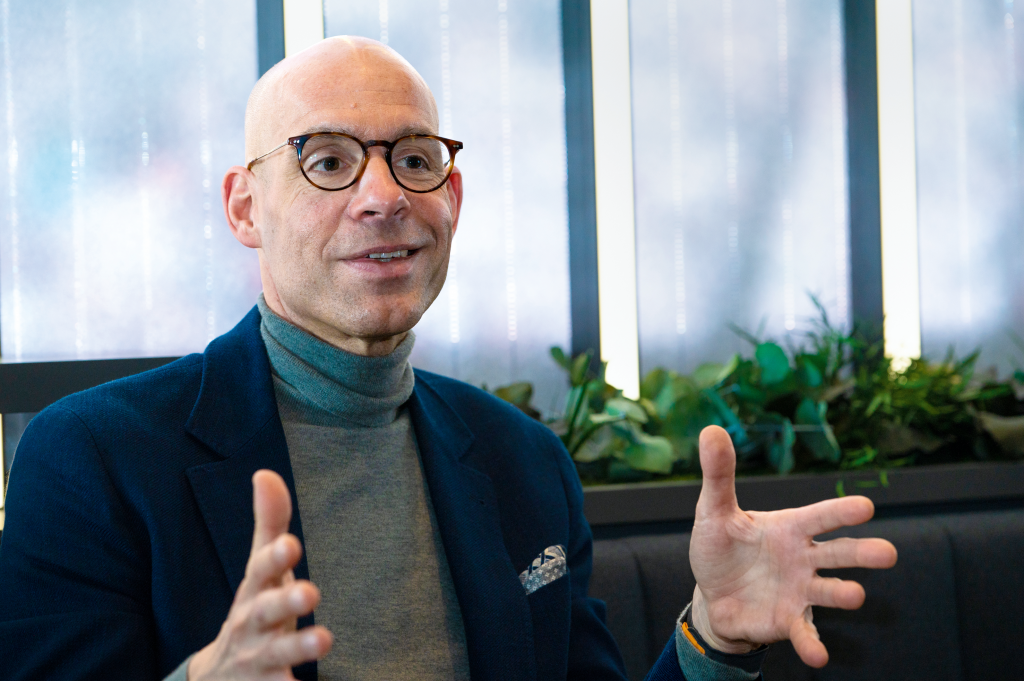
© Greiner AG
Plastic packaging materials, foams for mattresses and medical
products, among others – at first glance, these are completely
different fields. Do the three divisions, apart from the common
corporate umbrella, have anything in common?
Axel Kühner: The three divisions Greiner Packaging, Greiner Bio-
One and Neveon are united by the topic of plastics. After all, foams
are also a form of plastics; in all cases, they are products that are
intended to make our lives easier and better. Plastic packaging
protects food and makes it last longer. Foams provide comfort in
mattresses, sofas, and even car seats. And products for medical
technology are designed to help people receive faster and better
medical treatment.
Are all the divisions within the group on an equal footing, or
are there focal points?
Kühner: All three divisions are equally important
Plastic does not have a particularly shiny image, but it is impossible
to imagine daily life without it and everyone uses it. How
do you deal with this phenomenon?
Kühner: Plastic and sustainability are only contradictory at first
glance. Of course, unfortunately, our products also end up in the
sea and in the forest, and we are endeavouring to counteract this
with a circular economy. But plastic also ensures that food can be
kept longer. In addition, plastic requires less
energy to produce and use than metal and
glass, for example. As our products have become
an integral part of our daily lives, we have
enormous leverage and responsibility when it
comes to reducing emissions.
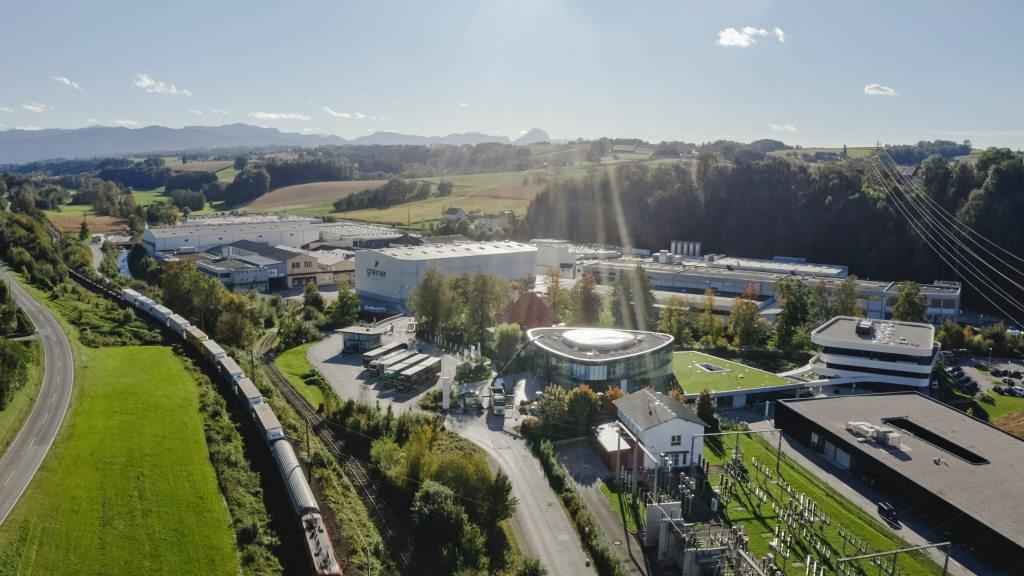
© Greiner AG
What do you mean by the term ‘sustainable
plastic packaging’?
Kühner: Packaging is sustainable, for example,
if it is recyclable, reusable or compostable. This is precisely our goal
by 2025 for all packaging from Greiner Packaging. We don’t yet have
all the final answers to the question of how we will achieve this,
but we are working every day to get closer to this goal.
What are you planning on making more sustainable in your
business areas in the future, or is even a circular plastic economy
possible?
Kühner: It’s important that we think about recycling right from the
product design stage. We have also purchased a Serbian recycling
plant in 2022 so that we can produce the recycled PET flakes we
need ourselves. In addition, we also try to keep the amount of
plastic in our products as low as possible. One
example of this is the K3 yogurt cup, which
consists of a thin plastic wall and a cardboard
wrap. In the new version of this Greiner invention,
the plastic and cardboard even separate
automatically due to the pressure in the sorting
machine. It is products like this that are changing
the market.
What are you planning on making more sustainable in your
business areas in the future, or is even a circular plastic economy
possible?
Kühner: It’s important that we think about recycling right from the
product design stage. We have also purchased a Serbian recycling
plant in 2022 so that we can produce the recycled PET flakes we
need ourselves. In addition, we also try to keep the amount of
plastic in our products as low as possible. One
example of this is the K3 yogurt cup, which
consists of a thin plastic wall and a cardboard
wrap. In the new version of this Greiner invention,
the plastic and cardboard even separate
automatically due to the pressure in the sorting
machine. It is products like this that are changing
the market.
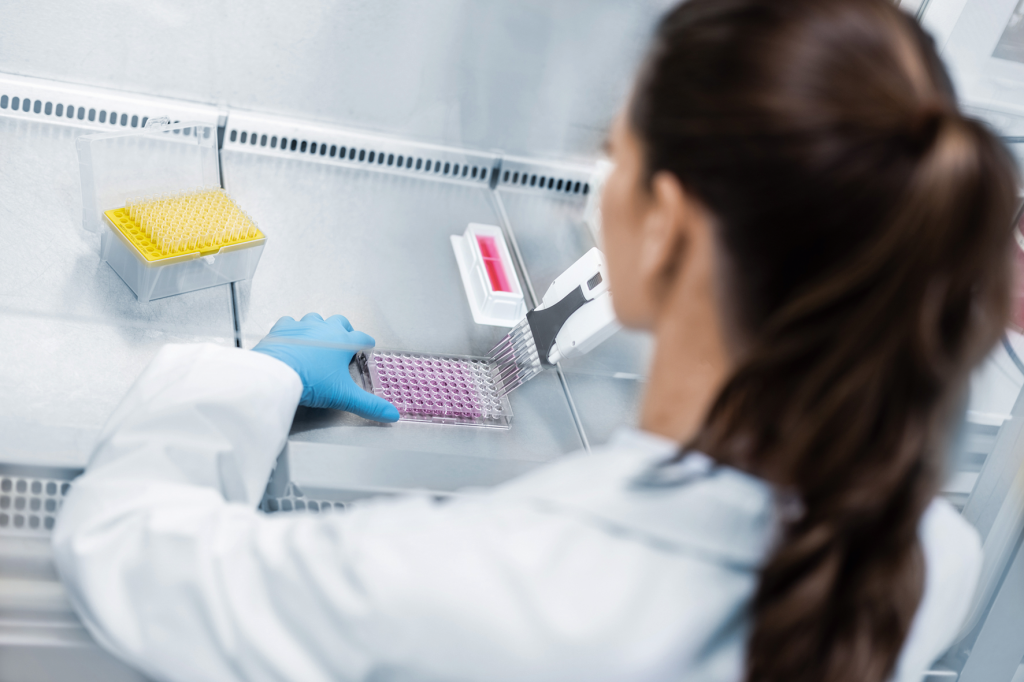
© Christian Huber
Are you researching plastic substitutes?
Kühner: Absolutely – one example is our youngest subsidiary
Greiner Zeroplast. The former start-up is developing bio-based
materials made of fibres, wax or lime, which can then be used in
industrial injection moulding. We are supporting Greiner Zeroplast in the technical implementation of the idea through to series production
readiness of the products. Through our innovation incubator
Greiner Innoventures, we are also involved, for example, in the
start-up Hempstatic, which produces soundproof panels from industrial
hemp. So, we are always interested in new materials if we
see promising and, above all, sustainable innovations
in them.
Greiner AG has been 100 percent family-
owned since it was founded. What advantages
does that bring?
Kühner: This ownership structure has the advantage
that long-term goals will always be
more important than quick profits. After all, a
family doesn’t think in quarters, but in generations.
Even though the Greiner family is no
longer operationally active in the company, you
can still feel the family spirit in the corporate
culture in that we try to live the family values.
And that is something very valuable in these fast-moving times. In
addition, the owners also have an impact through their role on the
supervisory board.
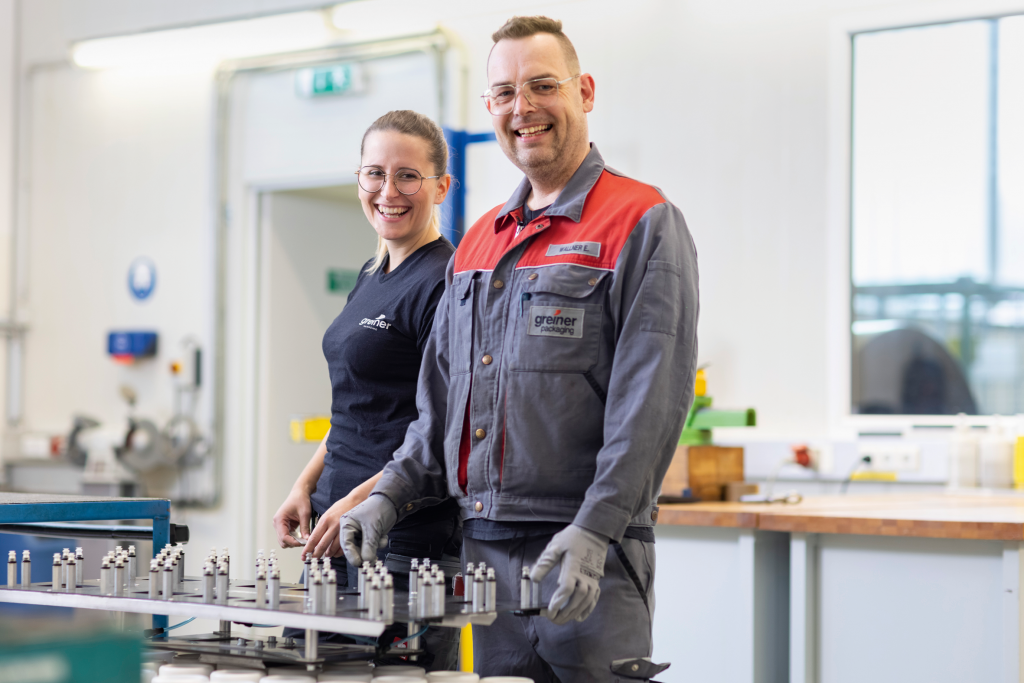
© Christian Huber
What impact do the rising prices of energy, raw materials and
labour have on Greiner?
Kühner: Fortunately, the plastics industry is not as energy-intensive
as the metal or paper industry, for example, but of course we
have felt the volatile energy prices. The raw material situation affects
the foam sector in particular; here, purchasing
prices are high and in some cases not all the
required quantities are available. Inflation is also
increasing the pressure on wages and thus also
on production costs. Under these conditions, we
nevertheless achieved a respectable result in
fiscal 2022.
You have more than 11,000 employees in
33 countries. What do you value about Austria
as a business location, which is not one of the
cheapest?
Kühner: That’s exactly why we have to be the
best! In addition to the central location in Europe
and the attractive investment environment, it is certainly also the
skilled workforce that speaks for Austria as a business location. For
example, apprenticeship training is unparalleled in an international comparison. As a result, we are able to train the specialised workers
we need ourselves. Nevertheless, the shortage of skilled workers
will be one of the greatest challenges in the coming years. One
reason for this is the demographic development – think of mass
retirement versus low birth rates.
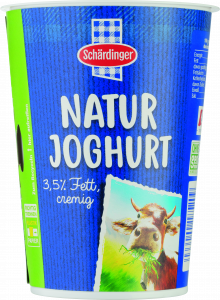
recycling easier for 40 years.
© Greiner Packaging
Your headquarters are located in Kremsmünster in Upper Austria.
What makes this market town attractive for a company’s
headquarters?
Kühner: We are operating worldwide, but at home in Kremsmünster.
And even though we now have a steadily growing site in Vienna
to take advantage of the labour market potential there, we
will always be an Upper Austrian company. At the end of 2022,
together with the Province of Upper Austria and the Municipality
of Kremsmünster, we opened the new Greiner Bridge, which we
co-financed with 1.45 million euros, which
is about one third of the actual construction
costs. This bridge increases
traffic safety in the region and
also symbolises the connection that
exists between the people of Kremsmünster
and Greiner.
What suggestions or wishes do
you have for politicians to strengthen
Austria’s competitiveness?
Kühner: With regards to the shortage
of skilled workers, we must be much
more proactive in addressing the issue
of immigration. Politicians must have
more courage to say why skilled immigration
is so important. And they must
also ensure that the female work force
participation rate increases. We can no
longer afford to forego a large part of the
workforce potential of women because
there are not enough childcare facilities,
and it is not worthwhile to pursue fulltime
employment. Of course, freedom of
choice is needed, but it must become
much more attractive and easier to work
full-time. The abolition of bracket creep
was a right step here, but more needs to happen. However, it is also important
that we develop the social will
for more participation and diversity.
Wo orten Sie die größten Herausforderungen in den kommenden Jahren?
Kühner: In the availability of highly
qualified specialists. Of course, high
energy prices are leading to a transformation
and a shift in production. Energy-
intensive industry will always go
where there are the best location factors.
This is a normal, economic change. The
question for Austria is: What can we do
better than others? It’s not about the lowest
production costs, but about expertise,
innovative capacity and new technologies.
That is why it is so important that we invest
more in education and training. That’s
where the action will be in future.
Can you imagine a world without plastic?
Kühner: No. Or to paraphrase Loriot: ‘Life
without plastic is conceivable, but it doesn’t
make sense’.